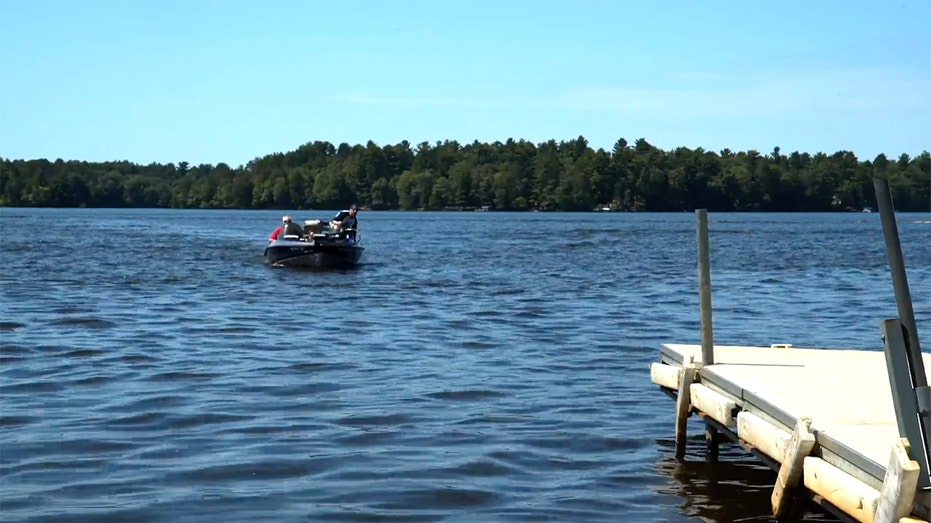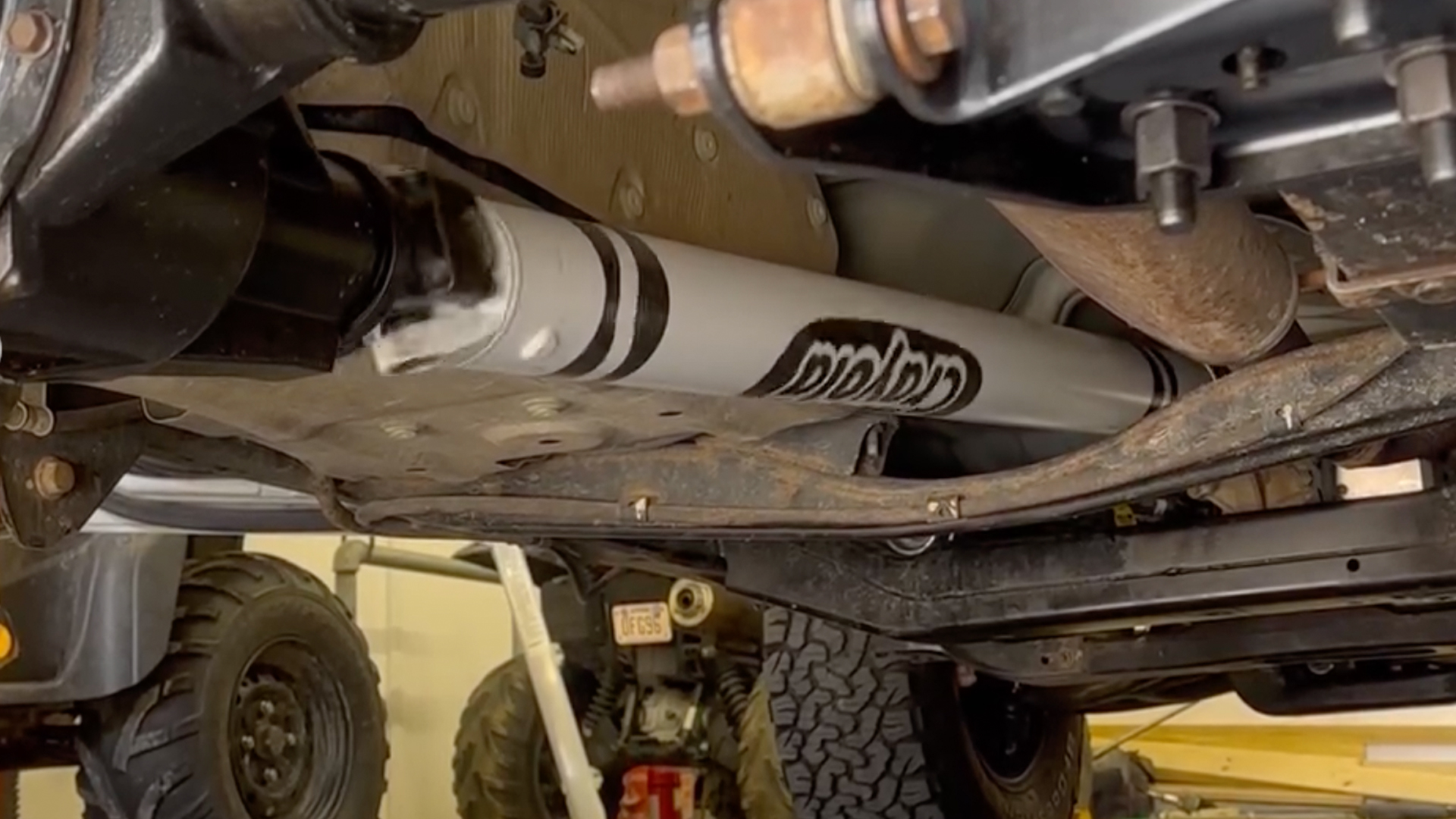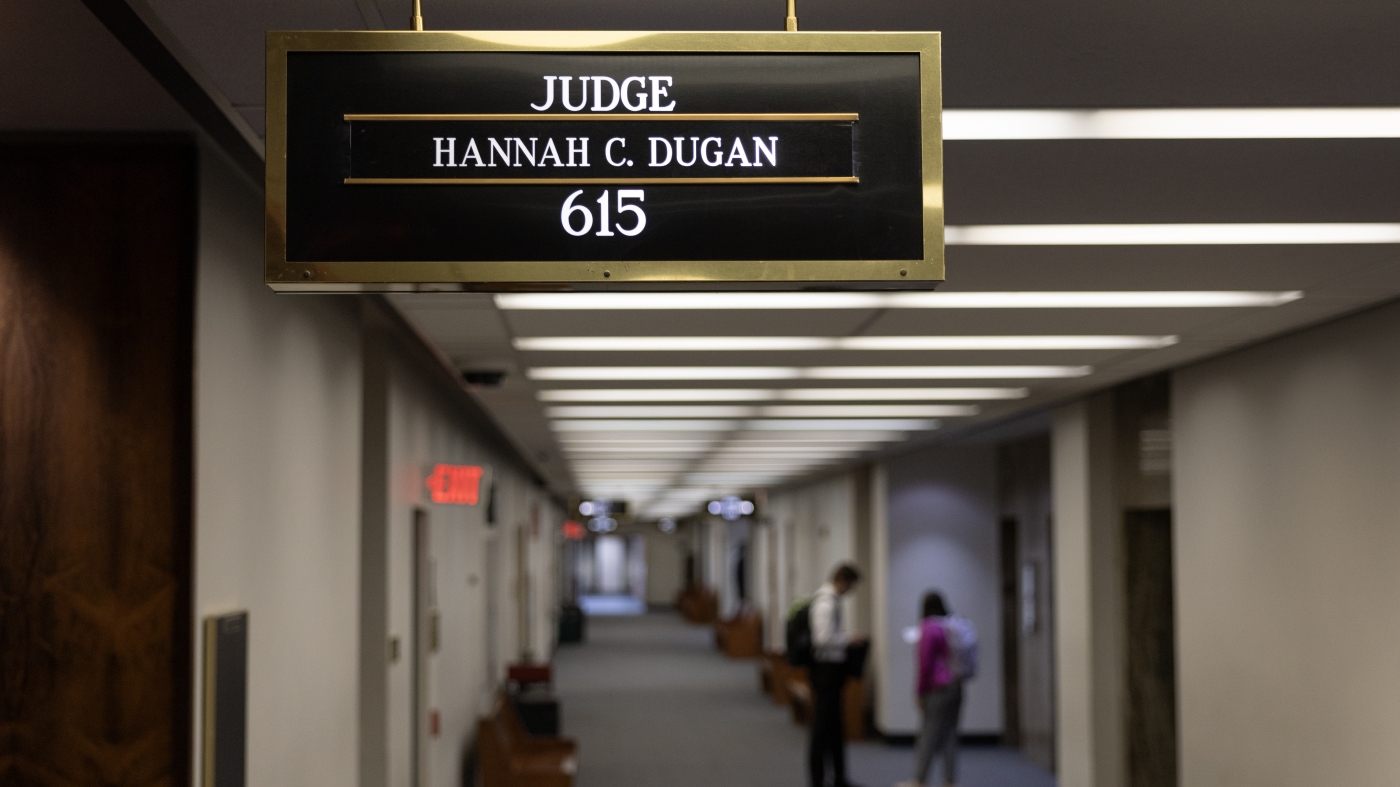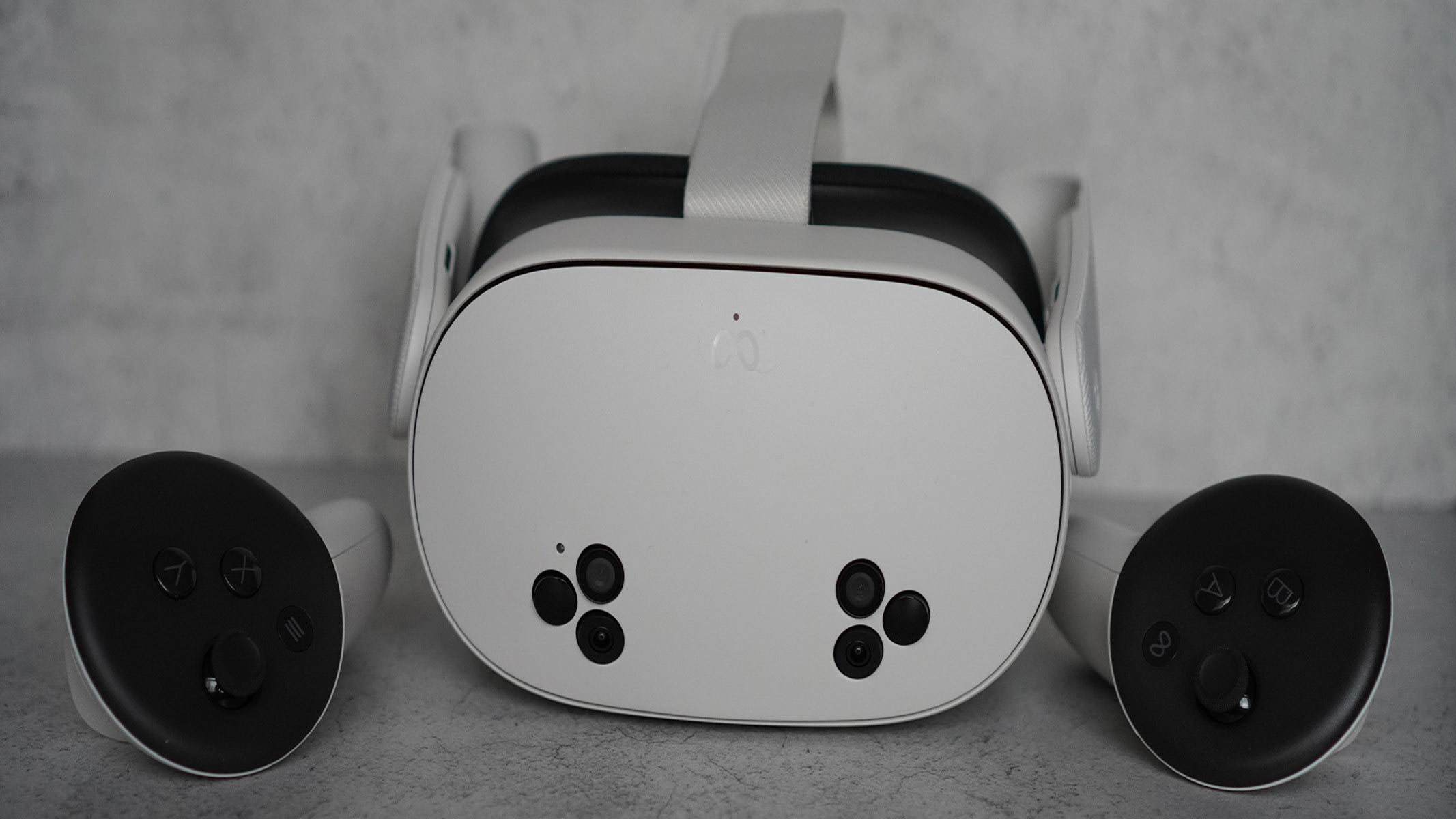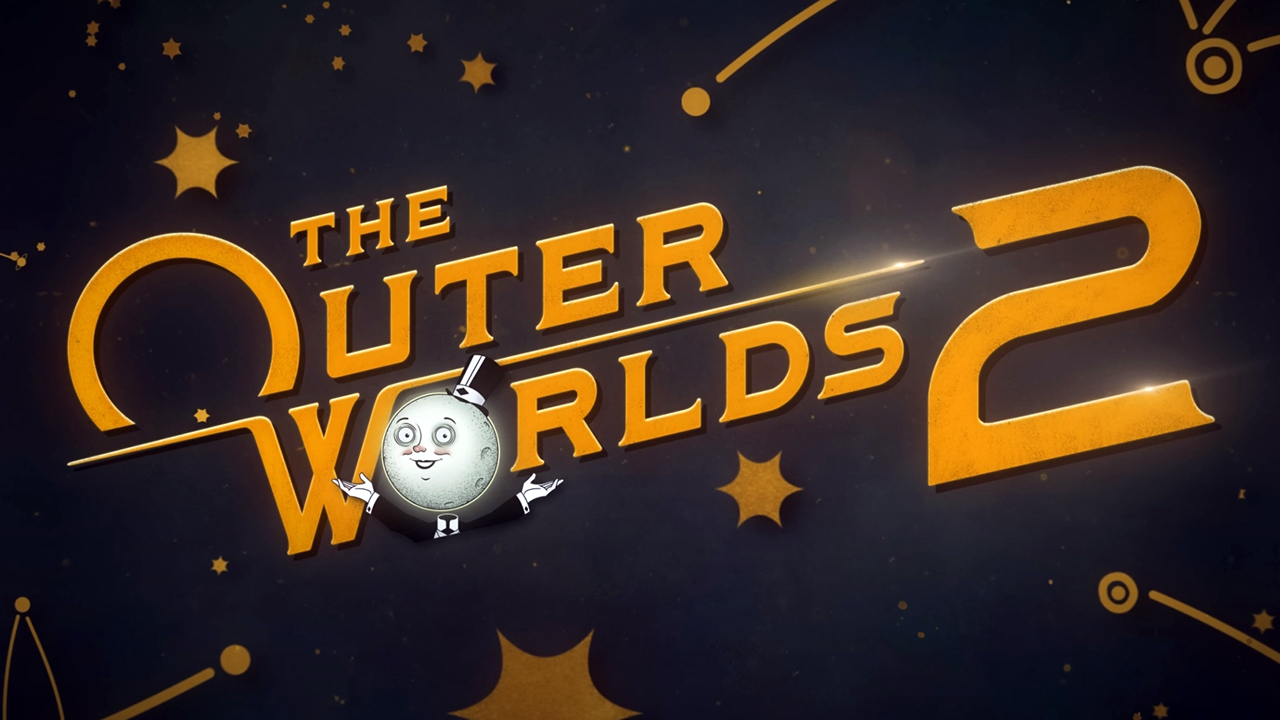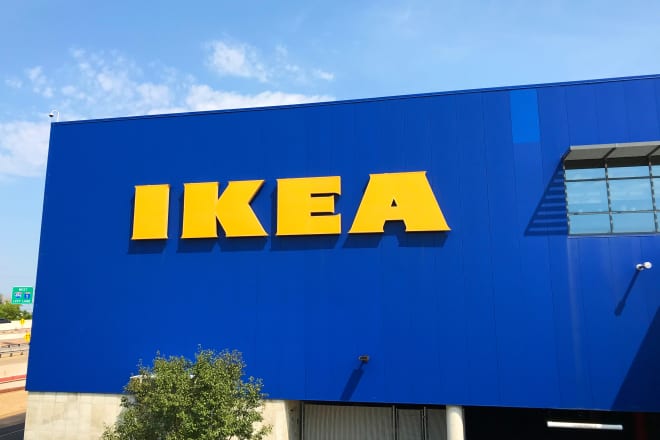Read <em>The Atlantic</em>’s Interview With Donald Trump
A conversation with the president about executive power, Signalgate, and 24-karat gold

Editor’s Note: Read The Atlantic’s related cover story, “‘I Run the Country and the World.’”
On Thursday, April 24, I joined my colleagues Ashley Parker and Michael Scherer in the White House to interview President Donald Trump. The story behind this meeting is a strange one, told in their new Atlantic cover story, which you can read here.
Ashley and Michael had been seeking an Oval Office meeting for some time. It had been scheduled, then angrily unscheduled, then followed by an impromptu interview from the president’s cellphone, and then by an apparent pocket dial from the president one night at 1:28 a.m., and then by a promise, again, for a sit-down, this time with a specific request from Trump that I accompany Ashley and Michael. This invitation was followed by a Truth Social posting from the president that read, in part, “Later today I will be meeting with, of all people, Jeffrey Goldberg, the Editor of The Atlantic, and the person responsible for many fictional stories about me.” Not entirely fictional in the president’s eyes, apparently, was the Signalgate controversy, which he said I was “somewhat more ‘successful’ with.”
We found the president—in an Oval Office redecorated in what I would call the Louis XIV Overripe Casino style—in an upbeat and friendly mood. Our numberless transgressions were, if not forgiven, then mainly ignored. Joining the president were his chief of staff, Susie Wiles; his communications director, Steven Cheung; the press secretary, Karoline Leavitt; and numerous other staff members.
What follows are substantial excerpts from our conversation, condensed and edited for clarity. Our main goal in the interview was to encourage the president to analyze his unprecedented political comeback, and explain the way he is now wielding power—including the question of whether he sees any limits to what a president can do. Trump’s main goal, it seemed, was to convince us that he has placed his presidency in service of the nation and of humanity. (A subsidiary goal was to ask us if we thought he should hang a chandelier in the Oval Office. The Atlantic takes no position on that matter.) He said many noteworthy things about Ukraine, about tariffs, and about the retribution-driven nature of his second term. I found our encounter fascinating and illuminating.
Welcome to the Oval Office
Donald Trump: This will be very, very interesting. You think Biden would do this? I don’t think so. How are you, folks?
Ashley Parker: Good, how are you? Thanks for having us in.
Trump: I’m good. Thank you very much.
Jeffrey Goldberg: Nice to see you. And thanks for announcing the interview on Truth Social.
Parker: Thank you for your discretion!
Trump: I wanted to put a little extra pressure on you. But at the same time, you’ll sell about five times more magazines.
Goldberg: Believe me, I understand the marketing here.
Trump: I did it for you. [He makes a sweeping gesture.] If you take a look back, Jeffrey, this is the new Oval Office—and people love it. Those paintings were all in the vaults. We have vaults downstairs. They have about 4,000 pictures, and I took some of the great presidents.
Goldberg: It really does look different.
Trump: Well, now it looks like it’s supposed to look. Before, they didn’t take care of it. There was no tender loving care.
Parker: Are you using your own money for the Oval Office?
Trump: Yeah, I do it on my own. You see up top? That came all out of Mar-a-Lago.
Parker: Really?
Trump: Yeah.
Goldberg: Wait, the gilded—?
Trump: Yeah, the gold. And that’s all 24-karat gold, which is interesting because they’ve never come up with a paint that looks like gold. They’ve never come up with a paint where you can just paint it and it looks like gold.
Michael Scherer: Is there truth to the rumor you’re going to do the ceiling?
Trump: Yeah, I’m doing that. The question is: Do I do a chandelier? Beautiful crystal chandelier, top of the line, beautiful. Would be nice in here. It almost calls for it, but I don’t know. We’re more focused on China, Russia.
But you know, this is all new. The George Washington was in the vaults. Most of those pictures were in the vaults. And it’s a great thing, you know. We just had the secretary-general of NATO, Mark Rutte. And we had the prime minister of Norway just preceding you. We have a lot of great relationships with people. People don’t talk about it much, but they all want to meet. So we’re trying to get the killing field ended, you know, in Russia.
Goldberg: Yes, we want to talk about that. But I first wanted to thank you for having us in. I think it’s better to talk than not talk. We are trying to do a cover story that I think is both fair and balanced.
Trump: That’s all I want. Fair. Fair and balanced. I’ve heard that before.
Goldberg: The animating question of our cover story is how you did it. If you look at January 2021, February 2021, people would not have bet that you would come back. And just to be fair, I wanted to ask you what you think I don’t understand about your presidency.
Trump: I really believe that what I’m doing is good for the country, good for people, good for humanity.
As you just heard, I was just with the prime minister of Norway and separately, outside, is the head of NATO. We also had the former head of NATO just a few minutes ago: Stoltenberg. Terrific guy; both terrific people. And they made a statement. They said, “If you don’t get this war ended, it will never end; it will go on forever, and people are going to be killed for a long time to come.” And, you know, they’re losing—I was saying 2,500 people a week; it’s close to 5,000 people a week, for the most part Russian and Ukrainian soldiers. And if we can stop that, that would be a great thing.
Goldberg: But let me ask you, because the portrait of Ronald Reagan is sitting right above your shoulder.
Trump: Yeah.
Goldberg: For 100 years, American presidents have innately sympathized with the smaller nations and peoples that have been bullied or oppressed by Russia. You don’t seem to have that same innate sympathy. It’s not just Ronald Reagan. It’s Jimmy Carter, JFK, and so on. Why don’t you seem to have that same feeling for these bullied, oppressed nations that every other American president has had?
Trump: I think I do. I think I’m saving that nation. I think that nation will be crushed very shortly. It’s a big war machine. Let’s face it. And if it weren’t for me—I’m the one that gave them the Javelins that knocked out the tanks. You know, that tank moment was a big moment, when the tanks got stuck in the mud, and I gave them tremendous numbers of Javelins. That’s the anti-tank busters. And they took out all those tanks when they got caught in the mud. You know, that was a big moment because, had those tanks gone in, they were 71 miles outside of Kyiv and they were going to take over Kyiv. That was the end of the war; it would’ve ended in one day.
And that was one of the reasons it went on. Now, I could also make the case that it’s too bad it went on, because a lot of people have died. A lot more people died in that war than is being reported. Not just soldiers. It’s a lot of soldiers, but it’s a lot of other people too. And, you know, I really can make the case that I’ve been very good because I’m saving that country. The prime minister of Norway—very respected guy—says that if President Trump didn’t get involved, this war would never end. I think I’m doing a great service to Ukraine. I believe that.
Goldberg: The Ukrainians don’t believe that, though.
Trump: Well, they don’t because they have pretty good publicity. Look, the war in Ukraine would’ve never happened if I were president. It would’ve never happened, and it didn’t happen for four years.
On Signalgate
Goldberg: I want to ask you about something that you just wrote in your Truth Social post. By the way, I love the line “I will be meeting with, of all people, Jeffrey Goldberg.”
Trump: Oh, you like that? I had to do that.
Goldberg: It’s a nice flair.
Trump: I had to explain to people. That’s my way of explaining to people that you’re up here, because most people would say, “Why are you doing that?” I’m doing that because there is a certain respect.
Goldberg: You wrote, after talking about “many fictional stories,” that I was “somewhat more ‘successful’” with Signalgate. I just didn’t understand what that means.
Trump: Well, I only meant that it got—
Goldberg: Are you saying that Signalgate was real?
Trump: Yeah, it was real. And I was gonna put in something else, but I didn’t have enough time.
Goldberg: How long does it take you to write these?
Trump: Not long.
Goldberg: I didn’t think so.
Trump: I go quickly as hell. You’d be amazed. You’d be impressed. And I like doing them myself. Sometimes I dictate them out, but I like doing them myself. What I’m saying is that it became a big story. You were successful, and it became a big story.
Goldberg: But you’re not saying that it was successful in the sense that it exposed an operations-security problem that you have to fix.
Trump: No. What I’m saying is, it was successful in that you got it out very much to the public.
Goldberg: Oh.
Trump: You were able to get something out. It became a very big story.
Goldberg: But is there any policy lesson from that, that you’ve derived and have talked to [Secretary of Defense] Pete Hegseth about, and [National Security Adviser] Mike Waltz?
Trump: I think we learned: Maybe don’t use Signal, okay? If you want to know the truth. I would frankly tell these people not to use Signal, although it’s been used by a lot of people. But, whatever it is, whoever has it, whoever owns it, I wouldn’t want to use it.
Parker: You don’t use Signal yourself?
Trump: I don’t use it, no.
Parker: You’re a big supporter of Pete Hegseth’s, but he’s fired three top advisers in recent weeks, he rotated out his chief of staff, he installed a makeup studio at the Pentagon, he put attack plans in two different Signal chats, including one with his wife and personal attorney. Have you had a talk with him about getting things together?
Trump: Yeah, I have.
Parker: What did you say?
Trump: Pete’s gone through a hard time. I think he’s gonna get it together. I think he’s a smart guy. He is a talented guy. He’s got a lot of energy. He’s been beat up by this, very much so. But I had a talk with him, a positive talk, but I had a talk with him.
Parker: How does he explain it?
Trump: Look, you had a secretary of defense that was missing in action for a week and nobody had any idea where he was. Think of that. And whether we like it or not, Afghanistan was perhaps the most embarrassing moment in the history of our country. I thought it was terrible. I was getting out. I would’ve kept Bagram Air Base. I was going to keep Bagram because it’s right next to where China makes their nuclear weapons. But you had a secretary of defense that did that, that led to that whole disaster, and, you know, I think that’s far, far worse.
Parker: But for now, you think Hegseth stays?
Trump: Yeah, he’s safe.
Parker: Does he stay longer than Mike Waltz?
Trump: Waltz is fine. I mean, he’s here. He just left this office. He’s fine. He was beat up also.
Scherer: A few weeks ago, several people on the National Security Council were dismissed. People like Laura Loomer and others have come to you with concerns about some people currently in your government. Should the American people expect that there will be more changes coming in terms of who’s working in your government?
Trump: I hope not, but you know, sometimes you learn about people later on. And people will give you recommendations. You would take recommendations about a writer, and then you find out six months later they did something that you weren’t happy with, and you probably let them go or admonish them, or let them go. And I hire, indirectly or directly, 10,000 people.
That’s a lot. You know, this office is where it all begins. It’s sort of an amazing office. Funny, I have the biggest people in the world coming into this office. They have great offices, they have great power, they have great companies or countries, and they all want to stop and they want to look: It’s the Oval Office.
You know, it’s an amazing thing. But through this office, I hire about 10,000 people. They say directly/indirectly, you know, from secretary of state and others, and appointments of Supreme Court justices—three—to much lower-level people. And during the course of all of those hirings, you know, you’re going to find out that you made a mistake.
On His Comeback
Parker: Our story is tracking the arc of a remarkable comeback. And not just the comeback. It feels like you are wielding power quite differently now. But my question has to do with January 2021—you’re in exile; you’re fighting for your political life.
Trump: I don’t think of it that way, but you’re right, I guess. There could be some truth to that.
Parker: When was the first moment when you realized you could return, when you realized that it could happen again?
Trump: So, I’m a very positive thinker. I was questioning whether or not I would want to come back, but I never thought that I wouldn’t be able to.
You had Ron DeSantis, who was a hot prospect. People were saying, “Oh, he’s gonna do great.” And you had, on the Democrat side—I guess—you had some that were hot. Who knows? I didn’t think they were hot. Biden, in my opinion, was a failed president. He let millions and millions of people into the country who shouldn’t be here. It’s a tremendous problem.
I thought that maybe I wouldn’t do it, but I thought if I did do it, I’d win. But I never considered it a comeback. A lot of people call it a comeback. Most people, I guess, call it the greatest political comeback in history. I think that’s an honor, but I don’t view it as a comeback. I just sort of view it as: I just keep trudging along.
I shouldn’t be embarrassed by that word, because it’s probably accurate. I just didn’t view it as a comeback.
Scherer: When I came to the Oval Office last week as part of the press pool, I asked you a question about the IRS going after Harvard, and you talked pretty passionately about conservatives being targeted by the IRS. You also put out the executive order—Chris Krebs, you accused him of violating the First Amendment, but you’re punishing him for his view on the 2020 election.
Trump: Right.
Scherer: There is a lot of concern in the country that your use of executive power to go after people you disagree with represents a slide toward authoritarianism. You put on Truth Social, maybe it was a joke: “He who saves his Country does not violate any Law.” Should people be concerned that the nature of the presidency is changing under you?
Trump: No. Look, in history, there’s nobody that’s been gone after like me. It may be harder for you guys to see because you’re on the other side of the ledger. But nobody’s been gone after like me. I didn’t realize it for a little while. I was told—when I fired [former FBI Director James] Comey, I was told that was a terrible, terrible mistake to fire him, that it’ll come back to haunt you. When I fired him, it was like a rock was thrown into a hornet’s nest. The whole thing went crazy in the FBI. And that’s where we found the insurance-policy statement. You remember the famous statement, “Don’t worry, he’s gonna lose. But if he doesn’t, we have an insurance policy”? The insurance policy was what they were doing.
There’s never been anybody that’s been gone after like I have. I say that in the first presidency, we accomplished a lot; you know, I’ve been given very good marks by, well, let’s say by people in the middle and on the right. On the right, definitely. But I’ve been given very good marks. And, you know, when you look at the economy, we then got hit with COVID, and when we handed back the stock market after COVID, it was higher than it was prior to COVID coming in, which is frankly pretty amazing.
But the real thing was: While I was here, I was being spied on; they spied on the initial campaign. And now that’s been proven—you know, many of these things were proven, the whole Mueller witch hunt; I mean, the bottom line on that was I had nothing to do with Russia.
Scherer: Let’s just—
Trump: Just to finish. This is a much more powerful presidency than I had the first time, but I accomplished a tremendous amount the first time. But the first time, I was fighting for survival and I was fighting to run the country. This time I’m fighting to help the world and to help the country. You know, it’s a much different presidency.
On Retribution
Goldberg: Let’s stipulate just for the purpose of the conversation that you are right about all of the things that you say happened to you. But you’re back on top now. Wouldn’t it be better to spend your time focused on China and all the other major issues, rather than vendettas against people who you think persecuted you four or eight years ago?
Trump: So, you have two types of people. You have some people that said, “You just had one of the greatest elections in the history of our country. Go do a great job, serve your time, and just make America great again.” Right? Then you have a group of people that say, “Do that. Go on and do a great job. But you can’t let people get away with what they got away with.” I am in the first group, believe it or not.
Goldberg: I’m not sure I believe it.
Trump: Yeah. But a lot of people that are in the administration aren’t. They feel that I was really badly treated. And there are things that you would say that I had to do with that I actually didn’t. Going after—and I don’t know if you say “going after”—but people that went after me, people in this administration who like or love Donald Trump and love MAGA and love all of it. I think it’s the most important political movement in the history of our country, MAGA.
Goldberg: Bigger than the founding of the Republican Party in the 1850s?
Trump: No, no, no, but it’s a big movement. There’s been few movements like it. So, it’s just been an amazing movement, and I think I have great loyalty. I have people that don’t like the way I was treated.
Goldberg: The thing that I can’t get my mind around is that you’re one of the most successful people in history, right? You’ve won the presidency twice—
Trump: Three times.
Goldberg: This is exactly the question! At this point in your career, don’t you think you can let go of this idea that you won? I mean, I don’t believe you that you won the 2020 election.
Trump: I’m not asking you to.
Goldberg: Most people don’t believe you won the 2020 election. A lot of people don’t believe you won. It goes to this point about vengeance versus moving forward.
Trump: Look, it would be easy for me not to just respond, when you say that, and I could just let you go on. But I’m a very honest person. I believe—I don’t believe; I know the election was rigged. Biden didn’t get 80 million votes. And he didn’t beat Barack Hussein Obama with the Black vote in the swing states—only in the swing states; it’s interesting. We have lots of other things. I mean, we have so much information, from the 51 agents—that was so crooked—to the laptop from hell, to all of these different things.
So it would be easier as you say that to just let you go on. But I’m a very honest person, and I believe it with all my heart, and I believe it with fact—you know, more important than heart. I believe it with fact. And it was a bad four years for this country. This country has been beaten up. We had a president that truly didn’t have it. I left some very smart people from other countries today, and I have them all the time. And I think maybe one of the things I’ve been most successful with is foreign relations.
Goldberg: I think the Canadians would disagree.
Trump: Well, the Canadians. Here’s the problem I have with Canada: We’re subsidizing them to the tune of $200 billion a year. And we don’t need their gasoline; we don’t need their oil; we don’t need their lumber. We don’t need their energy of any type. We don’t need anything they have. I say it would make a great 51st state. I love other nations. I love Canada. I have great friends. Wayne Gretzky’s a friend of mine. I mean, I have great friends. I said to Wayne, “I’m gonna give you a pass, Wayne.” I don’t want to ruin his reputation in Canada. I said, “Just pretend you don’t know me.” But they’re great people.
You know, they do 95 percent of their business with us. Remember, if they’re a state, there’s no tariffs. They have lower taxes. We have to guard them militarily.
Goldberg: You seriously want them to become a state?
Trump: I think it would be great.
Goldberg: A hell of a big Democratic state.
Trump: A lot of people say that, but I’m okay with it if it has to be, because I think, you know, actually, until I came along—
Goldberg: I’m no political genius, but I know which way they’re going to vote. They have socialized medicine.
Trump: You know, until I came along, remember that the conservative was leading by 25 points.
Parker: It’s true.
Trump: Then I was disliked by enough of the Canadians that I’ve thrown the election into a close call, right? I don’t even know if it’s a close call. But the conservative, they didn’t like Governor Trudeau too much, and I would call him Governor Trudeau, but he wasn’t fond of that.
On Whether He Will Try to Run in 2028
Parker: The Trump Organization is selling “Trump 2028” hats. Have you sought out a legal opinion about running a third time?
Trump: No.
Parker: I look at you and your presidency this time, and you’ve shattered so many norms, democratic norms—
Trump: That would be a big shattering, wouldn’t it?
Parker: That’s kind of my question.
Goldberg: That’s the biggest shattering of all.
Trump: Well, maybe I’m just trying to shatter—look.
Parker: Is that a norm too far?
Trump: Oh, people are screaming all the time, no matter where I go, “2028!” They’re happy. People are very happy with this presidency. I’ve had great polls, other than Fox. Fox never gives me great polls, but even at Fox, I have great polls, but Fox never gives me good polls. Fox is in many ways a disgrace for that. But, you know, I wrote something today, I said, “Rupert Murdoch for years has been telling me he’s gonna get rid of his pollsters,” but they never have—they’ve never treated me properly, the Fox people. But I’ve had great polls, including at Fox.
Parker: “Trump 2028,” that’s not a norm you’re willing to shatter?
Trump: Well, I just will tell you this. I don’t want to really talk about it, but it’s not something that I’m looking to do. It’s not something that I’m looking to do. And I think it would be a very hard thing to do. But I do have it shouted at me: “No, no, you’ve gotta run.”
On Due Process
Scherer: You’ve talked about moving American criminals to foreign prisons. You’ve criticized the courts for requiring due-process steps for deporting undocumented immigrants here in the country. Are there, in your mind, clear limits of how far you will go?
Trump: Yeah.
Scherer: Is there any reason that an American citizen would have to be concerned about their due-process rights being honored by your government? Or, and I mean, the Declaration of Independence reads: We don’t want to be subject to foreign jurisdiction—
Trump: Oh, could you open that? Pull that. [He directs Karoline Leavitt, the White House press secretary, to pull the blue curtains shielding a recently installed copy of the Declaration of Independence.]
Trump: How’s Karoline? How’s Karoline doing? Good? Doing a good job?
Goldberg: Karoline? She’s very tough on me.
Trump: Oh, is she? Uh-oh.
Goldberg: Oh, yeah.
Trump: I didn’t know that.
Goldberg: I probably just got her a raise by saying that.
Trump: Wow.
Karoline Leavitt: I did a whole briefing on Jeffrey Goldberg.
Trump: Oh, really? Ooooh, she could be tough. She could be tough. Anyway, this is pretty cool. That was in the vaults for many years, downstairs.
Scherer: So the original question was: What are the limits? Should American citizens be concerned about being sent to foreign prisons?
Trump: I did say that.
Scherer: Yes, and the issue the courts have raised is that people who are accused of being here illegally are being deported without due process. That raises the possibility that someone would be nabbed accidentally or improperly and deported, if you don’t have due process.
Trump: Well, they’re here illegally to start off with.
Scherer: But what if there’s a mistake? You might get the wrong person, right?
Trump: Let me tell you that nothing will ever be perfect in this world. But if you think about it: Clinton, Bush, and every president before me—nobody’s ever been challenged when they had so-called illegal immigrants in the country; they took them out of the country, and they took them out very easily and very successfully. With me, we’re going through a lot with this MS-13 person from, right now, from—where is he from? Where does he come from?
Steven Cheung: El Salvador.
Trump: Well, he actually comes initially from El Salvador, I guess. Yeah, I guess he comes from El Salvador. I knew he was outside of this country, way outside of this country, and then it turns out that his record is bad. They made him, like, the nicest guy in the world, a wonderful family man. And then they saw the MS-13, by mistake, on his knuckles, and they saw lots of other things.
Parker: But what about Americans who aren’t here illegally who may have committed a crime? Do you feel like they are guaranteed due process?
Trump: If a person is legally in the country? That’s a big difference between being legally in the country and illegally.
These people are illegally in the country, all of them. So we have 250,000 people that we want to bring out. They’re rough, tough people. Rough, tough. Many arrests, some from hitting women over the head with a baseball bat when they weren’t looking; some from driving a motorcycle, pulling her along the street, she hits a lamppost, is horribly hurt. If you look at the registers, some from pushing people in the subway just prior to the subway train coming, chugging along, and they get pushed into the train and either get very badly hurt or die, mostly die.
And I said “if,” “if,” in terms of foreign prison, “if it’s legal,” and I always say “if it’s legal.” Jeffrey, I said—I did talk about this—I would love it, you have people that are back and forth between sentences 28 times, people that are put back and forth into jail, they immediately go out and they whack somebody or they hurt somebody, or they do something very bad, and they go back, and they’ll have, like, 28 different sentences.
If it was legal to do—and nobody’s given me a definitive answer on that—but if it was legal to do, I would have no problem with moving them out of the country into a foreign jail, which would cost a lot less money.
Scherer: In terms of a definitive answer, you still believe the judiciary is an equal branch of government and you will abide by whatever the Supreme Court says in the end?
Trump: Oh, yeah. No, I always have. I always have, yeah. I always have. I’ve relied on that. I haven’t always agreed with the decision, but I’ve never done anything but rely on it. No, you have to do that. And with that being said, we have some judges that are very, very tough. I believe you could have a 100 percent case—in other words, a case that’s not losable—and you will lose violently. Some of these judges are really unfair.
But I do say, Jeff—I do say “if it’s legal.” I always preface it by saying that, because I think it sets a different standard.
On the Economy
Scherer: There’s talk on Wall Street of what they call a “Trump put,” meaning that there’s a bottom to how far the market will fall, because if we’re headed to a recession, you’ll change your tariff policy. If we’re headed to de-dollarization and bond interest rates are rising, you’re going to change your tariff policy to adjust for that. Is that a fair characterization, that you’re watching the markets and that you’re going to try and protect the American economy?
Trump: I don’t think so. I don’t see how I could possibly change, because I saw what was happening. I’ve been saying this for 35, 40 years: I’ve watched this country get ripped off by other nations, and I say “friend and foe.” And believe me, the friends are in many cases worse than the foe. Look, we lost trillions of dollars last year on trade with this guy [Biden], trillions of dollars. And every year, we lose trillions. Trillions, right? Hundreds of billions, but basically trillions; we went over the ledge into the T word. And I can’t imagine it’s sustainable to have a country that can lose that much money for years into the future.
And I felt somebody had to do something about it. And already, I have tariffs on cars, as you know, of 25 percent; tariffs on steel of 25 percent; tariffs on aluminum of 25 percent. I have a base tariff of 10 percent for everybody, for every country, and that’ll be changed. And a little bit of a misnomer: I have a lot of negotiations going on, but I don’t have to. I do that because I want to see how they’re feeling. But I’m like somebody that has a very valuable store and everybody wants to shop in that store. And I have to protect that store. And I set the prices.
And we’re gonna be very rich. We’re gonna make a lot of money. So I don’t think the answer is that it will affect me. It always affects you a little bit, but I don’t think—and certainly there’s no theory, like you say, that if it hits a certain number—I don’t know where it is today. How’s the stock market?
Goldberg: I don’t track it hour to hour.
Trump: Anybody know? Let’s see. Just give me the good news if it’s good.
Leavitt: It’s up. All green.
Trump: How much is it up?
Leavitt: Dow is up 419 points; NASDAQ’s up—
Trump: This is a transition period. It’s a big transition. I’m resetting the table. I’m resetting a lot of years. Not from the beginning, you know. Our country was most successful from 1850 or so to, think of this, from 1870—really, from 1870 to 1913. And it was all tariffs. And then some great genius said, “Let’s go and tax the people instead of taxing other countries.”
We were so successful that the president set up committees, blue-ribbon committees, on how to give away the money. We were making so much money. And then we went to an income-tax system after that. And by the way, they brought the tariffs back, and after the Depression started, you know, they liked to say, “Oh, tariffs caused—” I might as well get that little plug in, because the one thing they say, “Well, tariffs caused the Depression.” No, no, we went into the Depression. We were in there for a while and they said, “Maybe we could go back to tariffs and save it.” But that ship had sailed.
On Reality
Parker: Another theme of our story: You mentioned being a positive thinker. Putting the 2020 election aside, what have you learned about your ability to will reality into existence, or to shape the world around yourself? Can you tell us how that works?
Trump: Well, I think a vast majority of the Republican Party thinks I won in 2020. And I don’t think it’s necessarily what I’ve said. I think they have their own eyes and they have their own minds. They’re very smart people, actually.
Parker: The election aside, how are you able to do that? It seems like you sometimes are able to create reality, to make things true, simply by saying them.
Trump: Well, I’d like to say that that is reality. You know, I’m not creating it. But maybe you could use another subject, because probably I do create some things, but I didn’t create that; I think that is reality. I have an amazing group of people that love what I’m saying.
We don’t want crime. We don’t want people getting mugged and killed and slapped and beat up. We don’t want to be taken advantage of on trade and all these other things. We want to keep the taxes low. We want to have a nice life. And we weren’t having a nice life these last four years. People were really, really unhappy. And you saw that in the election. It’s hard to win all seven swing states. And I won them by a lot. You know, I won all seven.
I just think that I say what’s on my mind.
On Democrats
Trump: I also say things that are common sense, but it’s not that I say them because they’re common sense. It’s because that’s what I believe. It turns out to be common sense. When I hear—I watched this morning a congressman, who I don’t even know, fighting like hell to have men play in women’s sports.
And I think it’s a 95 percent—you know, they say it’s an 80–20 issue; I think it’s probably a 95 percent issue. And I don’t fight it too much. I don’t even mention it now. I save it for before an election, because I don’t want to talk them out of it. I see this Congresswoman Crockett [a Democrat from Texas], who’s so bad, and they say she’s the face of the party. If she’s what they have to offer, they don’t have a chance.
I think that the Democrats have lost their confidence in the truest sense. I don’t think they know what they’re doing. I think they have no leader. You know, if you ask me now, I know a lot about the Democrat Party, right? I can’t tell you who their leader is. I can’t tell you that I see anybody on the horizon. I would tell you, if you said, “Well, who do you think it would be?”
Parker: Yeah, who?
Trump: I don’t see anybody on the horizon. Now, maybe there’s somebody—
Goldberg: Not Wes Moore, Shapiro, Beshear, any of these?
Trump: So I spoke to Shapiro the other day. I liked him. I called him about his house, which was terrible. I said, “We’re behind you 100 percent.” And we had our people look and everything. It was a hell of a fire. You know, usually you hear that stuff and you see not much damage. That was—that place was burned out. I spoke to him. I like Shapiro. I think he’s good. I don’t know that he catches on. You never know what’s going to catch on.
Parker: Gretchen Whitmer?
Trump: I think she’s very good. She was here. You know, she took a lot of heat. She was here because she wanted to have me keep open an Air Force base, a very big one up in Michigan. A very noble cause.
Scherer: When we first talked to you on the phone, I asked if you were having fun. You said you were having a lot of fun. That was a month and a half ago. Has something between then and now been much harder than you expected?
Trump: It’s much softer than it was the last time. If you look at the inauguration, the first time, I didn’t have any of the people that you saw the second time, or the third time, I guess you would call it.
Scherer: Do they call you to complain about their portfolios, their net worth, with the stock market going down?
Trump: No, nobody—nobody called. Most people say, “You’re doing the right thing.” I mean, they’re doing the right thing. It’s not sustainable what was happening with our country. We were letting other countries just rip us to pieces.
I think I’m doing the country a great service. It would be easier for me if I didn’t do it. I could have a really easy presidency. Just come in here, leave everything alone, don’t go through the tariff stuff. And I don’t find it hard. I don’t find it hard to sell. All you have to do is say, “We lost trillions of dollars last year on trade.” And, you know, other countries made trillions. You know, China made one and a half trillion dollars on trade. They built—they’re building the biggest military you’ve ever seen with that. And they’re building it with our money.
On Zelensky and Putin
Goldberg: Just to go back to the Russia question. “Vladimir, STOP!” You wrote that today on Truth Social.
Trump: Yeah, I did.
Goldberg: He doesn’t strike me as the kind of guy who will say, “Oh, well, Trump told me he wants to stop, so I’m going to stop.”
Trump: You may be surprised.
Goldberg: Well, if that’s the case, I’ll come back and say, “You were right. I was wrong.” But I think I’m right. He’s not the kind of guy who’s going to just stop trying to take over all of Ukraine. The question is: If he advances, if he has more military success—
Trump: Which is possible.
Goldberg: Blowing up apartment buildings—
Trump: Sure.
Goldberg: Do you ever see a situation in which you’re going to come in, not with troops, but with more weaponry, with full-blown support for Ukraine to keep its territorial integrity?
Trump: Doesn’t have to be weapons. There are many forms of weapons. Doesn’t have to be weapons with bullets. It can be weapons with sanctions. It can be weapons with banking. It can be many other weapons.
Goldberg: Is there anything that Putin could do that would cause you to say, “You know what? I’m on Zelensky’s side now.”
Trump: Not necessarily on Zelensky’s side, but on Ukraine’s side, yes. Yeah. But not necessarily on Zelensky’s side. I’ve had a hard time with Zelensky. You saw that over here when he was sitting right in that chair, when he just couldn’t get it.
Goldberg: That was one of the strangest things I’ve ever seen in the Oval Office.
Trump: All he had to do is be quiet, you know? He won his point. He won his point. But instead of saying “Okay” when I made the statement, I said, “Well, we’re working to get it solved. We’re trying to help.” He said, “No, no, we need security too.” I said, “Security?”
Goldberg: Well, isn’t he supposed to advocate for his country?
Trump: Yeah, he is, but somehow, let’s get the war solved first. I actually said, “I don’t even know if we’re gonna be able to end it.” You know, he was talking about security after. After. And then he made the statement, something to the effect that they fought it alone, they’ve had no help. I said, “Well, we’ve helped you with $350 billion, and Europe has helped you with far less money,” which is another thing that bothers me.
We’ll have to see what happens over the next period of pretty much a week. We’re down to final strokes. And again, this is Biden’s war. I’m not gonna get saddled—I don’t wanna be saddled with it. It’s a terrible war. Should have never happened. It would’ve never happened, as sure as you’re sitting there.
Goldberg: So that scene with President Zelensky over here, you don’t think that scared Taiwan or scared South Korea or Japan?
Trump: No. No.
Goldberg: They’re not asking, “That’s the way he treats allies?”
Trump: Well, look. Ready? We’ve been treated so badly by others. We went to South Korea and we took care of them because of the war. We took care of them and we never stopped. You know, we have 42,000 troops in South Korea. Costs us a fortune. I actually got them to pay $3 billion, and then Biden terminated it. I don’t know why. They’ve become very rich. They took shipping; they took our cars. You know, they took a lot of our businesses, a lot of our technology.
You don’t have to feel sorry for these other countries. These other countries have done very well at our expense, very well. And I want to protect this country. I want to make sure that you have a great country in another hundred years. It’s a very important time. Jeffrey, this is a very important time right now. This is one of the most important periods of time in the history of our country right now.
One Final Thing
Scherer: Did you mean to call me at 1:30 in the morning after the UFC fight? I got a call—
Trump: After what?
Scherer: After the UFC fight in Miami, I got a call from your cellphone number at 1:30 a.m.
Trump: Really? Oh, no, that’s another—that sounds like another Signal thing.
